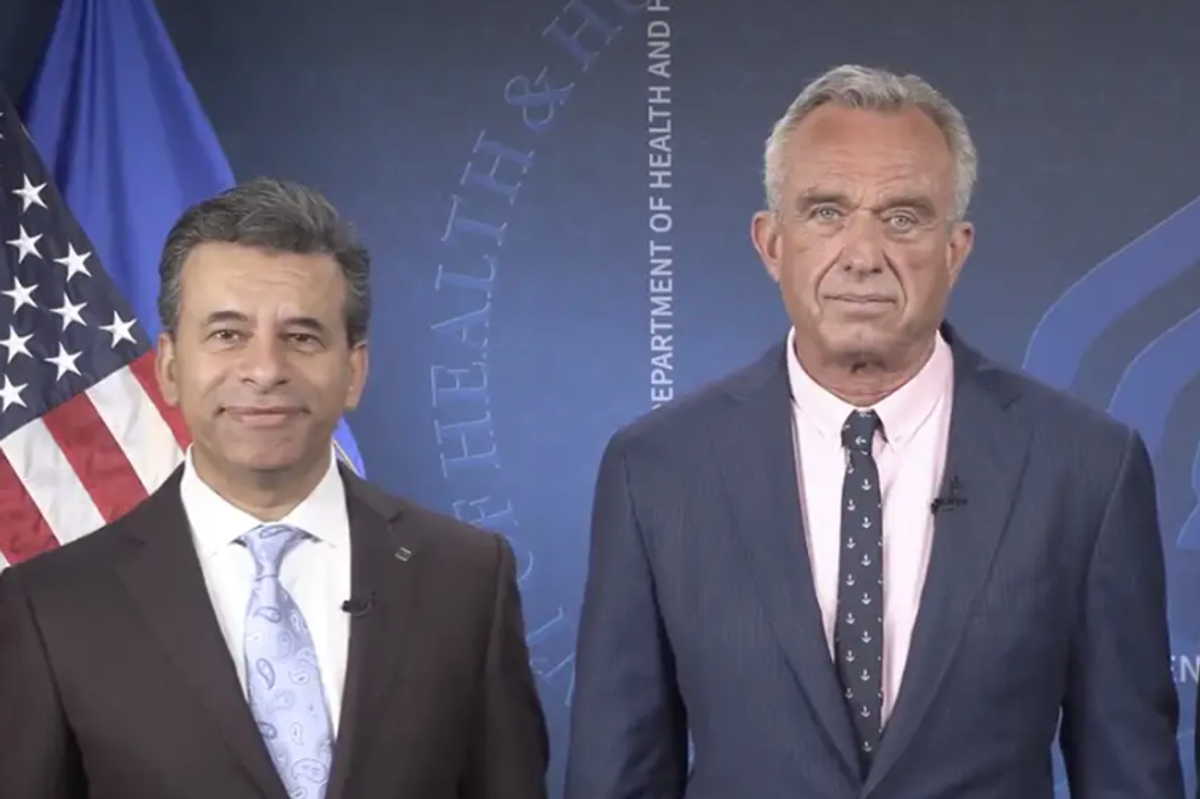Abandoning 'Transparency,' RFK Jr Initiates Shady Drug Approval Scheme

FDA Commissioner Marty Makary, left, and HHS Secretary Robert F. Kennedy Jr
HHS Secretary Robert F. Kennedy Jr. at first promised “radical transparency” at all agencies within his department. Then he fired almost all the freedom of information staff at the Centers for Disease Control and Prevention, the Food and Drug Administration and the National Institutes of Health; cancelled meetings of FDA and CDC advisory committees that review vaccines and vaccine policies; and held meetings of his Make America Healthy Again Commission behind closed doors.
Marty Makary, the new head of FDA, boldly promised to purge all physicians and scientists on the agency’s 49 outside advisory committees with ties to private industry. The move, he said, heralded a new era where advisory committees with a diversity of opinions would offer advice free from industry influence.
Then, on Tueday, he announced a new program that will set up internal committees to rapidly approve experimental drugs within two months of receiving a company’s application. Given the short time frame, this will effectively bypass the agency’s advisory committee process.
The usual FDA review process often includes holding advisory committee meetings, especially when the clinical trial evidence on safety and efficacy for an experimental therapy is borderline. The review usually takes anywhere from ten months to a year.
As for speeding up the process, the agency already offers priority review vouchers for new drugs that meet unmet medical needs, treat rare diseases or are considered a breakthrough therapy. Those vouchers can then be used on any future drug application even if it doesn’t meet any of those criteria. It can also be sold to another company seeking rapid approval of a drug that isn’t critical.
Some products receiving priority reviews by agency scientists also benefit from the FDA’s accelerated approval process, where approvals are based an improvement in surrogate markers — biomarkers like elevated amyloid plaques in Alzheimer’s patients or tumor shrinkage in cancer patients that aren’t necessarily associated with a better outcomes when the final results of those clinical trials are in (which sometimes are never submitted because the drug companies fail to complete the trials).
What’s new here?
The new program layers on an immediate rapid review to any company developing a new drug or device that meets one of four criteria: Does it address a health crisis; deliver an innovative cure; meet an unmet public health need; or increase the nation’s domestic drug manufacturing capacity?
The first three criteria are so vague as to be essentially meaningless. Virtually every drug and device company claims their new products are innovative and address unmet needs, even when they’re the sixth drug in a class that treats an already well-managed condition.
As Aaron Kesselheim, a professor of medicine and member of the Center for Bioethics at Harvard Medical School, told STAT News yesterday: “It sounds like a way of giving out political favors rather than actually meaningfully changing or enhancing the regulatory process.”
The internal process for making decisions after awarding these new priority reviews will be equally problematic. Makary, a surgical oncologist, plans to convene experts from various FDA offices for a “1-day” team review that he compared to the tumor boards hospitals use when faced with a critically ill cancer patient. “This voucher harnesses that model to deliver timely decisions for drug developers,” he said in his statement.
That ignores the fact that many new drugs to treat chronic conditions like dementia, cancer, autoimmune disorders, and rare genetic diseases are often barely effective. They often have troubling safety profiles requiring careful weighing of minimal rewards against serious risks. These are the areas where FDA reviewers are most in need of advice from outside experts through the advisory committee process.
Prior to advisory committee meetings, the FDA publishes much of the data submitted by the companies seeking a new drug approval. It posts on its website its own analysis as well as the companies’ presentations of the data, which the public can review prior to the meeting. The meeting itself — often stretching over several days — are open sessions where the advisors hear from clinicians who treat patients suffering from the disease as well as consumer and safety advocates who urge the agency to give careful consideration to the risk-reward ratio.
Will these one-day “tumor board”-like sessions be open to the public? Will internal documents be published? Will they hear from interested parties?
If the goal of the new program is to shorten the FDA’s review time, the agency needn’t come up with another work around. The simplest solution is to hire additional staff.
Instead, HHS at the urging of Elon Musk’s DOGE and the Russell Vought’s Office of Management and Budget announced the FDA will be laying off 3,500 of its 19,000 staffers, exempting for the time being new product reviewers. Why not use the savings to hire more internal reviewers? That’s the surest path to shortening review times.
This new program also ignores the fact that the FDA is already heavily dependent on industry user fees to fund its review staff, which is the biggest conflict of interest at the agency. Why don’t Kennedy and Makary go to Vought and his boss in the Oval Office to demand they include more taxpayer funding for FDA reviewers instead of giving more tax breaks to the wealthy and large corporations?
Reprinted with permission from Gooz News.
- Too Little, Too Late: RFK Jr. Suddenly Is Promoting Measles Vaccination ›
- 'You Own This': Top GOP Senator Burned As Kennedy Wrecks Health Services ›
- Bobby's MAHA Mania: Die Now, Eat Healthier Later ›
- 'Complete Fraud' RFK Jr. Caught Chomping McDonald's Burger With Trump ›
- Kennedy's Latest Cuts To Food Safety Could Make America Very Sick ›








